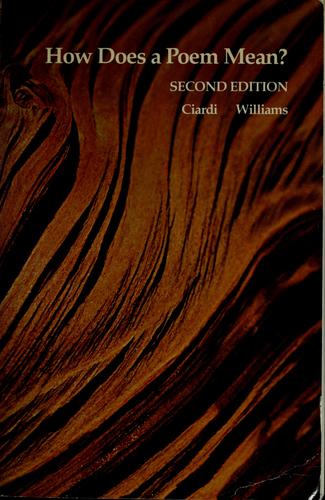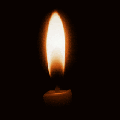4thace reviewed How does a poem mean? by John Ciardi
Review of 'How does a poem mean?' on 'Goodreads'
3 stars
I requested this fifty-year-old textbook from my library based on what Matthew Zapruder wrote about it in his book [b:Why Poetry|23213841|Why Poetry|Matthew Zapruder|https://i.gr-assets.com/images/S/compressed.photo.goodreads.com/books/1507060080l/23213841.SY75.jpg|42756259] along with my longstanding admiration for Ciardi's translations of Dante. In it the authors talk about the difficulties readers have getting at what a poem is all about. There are clues from the verse form, the choice of words, the images used, and the interplay of ideas, each of which gets a section in this work. I think it was probably intended for undergraduate poetry classes and popular enough to merit a second edition after its original publication in the late 1950s. The majority of the poems are from the canon of English writers of the last few centuries, but there are some mid-twentieth century works also, though the selection is not as diverse as what a reader might be sued to today. After some …
I requested this fifty-year-old textbook from my library based on what Matthew Zapruder wrote about it in his book [b:Why Poetry|23213841|Why Poetry|Matthew Zapruder|https://i.gr-assets.com/images/S/compressed.photo.goodreads.com/books/1507060080l/23213841.SY75.jpg|42756259] along with my longstanding admiration for Ciardi's translations of Dante. In it the authors talk about the difficulties readers have getting at what a poem is all about. There are clues from the verse form, the choice of words, the images used, and the interplay of ideas, each of which gets a section in this work. I think it was probably intended for undergraduate poetry classes and popular enough to merit a second edition after its original publication in the late 1950s. The majority of the poems are from the canon of English writers of the last few centuries, but there are some mid-twentieth century works also, though the selection is not as diverse as what a reader might be sued to today. After some of the reprinted poems, the authors pose some open-ended questions designed to get the reader thinking about the techniques employed by poets to convey meaning, and to compare different poems according to how they implement these patterns for the kind of effect they are after. There were a few original unusual poems modeled after an original only with some changes in the words, not claiming to be great works, but instructive for what is gained or lost with the changes. There were some poems where the attitude of the ones collecting them were not entirely favorable, an instructional technique I don't remember seeing in other books about prosody.
Overall I think the book holds up pretty well, though if someone were thinking of adapting it for a third edition now I am sure there would be many changes. There was a lot of talk about meter in the second half of the book which I mostly skimmed over, because beyond blank verse and ballad meters I personally don't have a lot to do with that kind of structure. There was no mention of prose poetry and only a short section devoted to poems from the Far East and English poetry inspired by those traditions. I thought the selection of poems was quite good, with a number of poems I didn't know even if they were written by people I'd heard of before. Someone knowledgeable with the field will be likely to notice many aspects not only of poetry but of literary culture in general which are a Big Deal now but simply lacking in this text that was modern in the 1970s. But having read this book through one time (skimming some sections, including entire poems, depending on my whim), I don't have any special hankering to have a copy on my shelves to refer to in the future.

